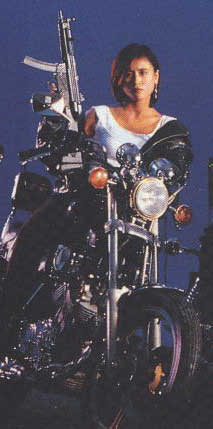

Early Career: Taiwan to
Hong Kong
“You damn Japanese” (“Close Escape”)
Although Yukari has indicated that she never sought to be famous, she
nevertheless needed to struggle for good parts. Yukari first appeared
in two Taiwanese films (“The Funny Family,” “A Book of Heroes”) released
in 1986 in which she was given limited opportunities to display her amazing
fighting talent and athleticism, but little screen time or character development.
As soon as her fights ended there was a cut to another scene. At
this juncture her screen persona appeared rather dour and remote, probably
reflecting her Japanese movie influences such as Sonny Chiba and Etsuko
Shiomi. She had appeared with Yasuaki Kurata - who had co-starred
with both Chiba and Shiomi - and he was apparently instrumental in recommending
her for a part in Sammo Hung’s “Millionaire’s Express” (1986). Yukari
briefly appeared as an androgynous samurai warrior, carving her way through
Sammo Hung’s stunt team and opponent Richard Norton. This brilliant
cameo presaged three career themes - Yukari’s asexual fighter persona,
her extraordinary athleticism, and ability to steal a scene with screen
presence out of all proportion to the size of her part. Ultimately,
these same three themes appear to have been responsible for undoing her
career.
“You’re a nice guy . . . girl.” (“Once
Upon a Time in Manila”)
Known in Cantonese as Tai To Yau Ka Lei, Yukari appeared as Tsumura
Yukari in her early screen roles. It appears that Hong Kong filmmakers
did not quite know what to do with her. While her physical talent
could not be ignored due to the perpetual shortage of full-contact martial
arts actors, she nevertheless did not fit the female stereotypes of a male-controlled
industry. Not only was Yukari Japanese - bitterly resented by many
Asian nationalities - she also was neither sensual nor particularly beautiful.
In the few romantic parts Yukari subsequently attempted, the way she tenses
up or blinks suggests these roles were quite unnatural for her and she
did not develop much on-screen chemistry with male leads other than Mark
Cheng. In close-up the camera was not kind to her skin, and her occasional
smiles revealed a mouthful of jagged, overlapping teeth. Her slightly cross-eyed
gaze, rolling walk and preference for athletic gear or paramilitary drag
scarcely fit female stereotypes.
When she was paired with Moon Lee (Lee, Choi-Fung) in the film “Angel”
(1987) these attributes made her a perfect movie villain. Her portrayal
of the sadistic Madam Yeung is one of her most memorable, and has even
merited mention on a contemporary S&M website! This successful
movie arguably helped launch the “girls with guns” genre, but regrettably
established Yukari as a supporting actor for Moon Lee. Throughout
their subsequent pairings (“Dreaming The Reality,” 1991, “The Big Deal,”
1992, “Kickboxer’s Tears,” 1992, “Beauty Investigator,” 1992, “Mission
of Justice,” 1992, “Avenging Quartet,” 1992, “Angel Terminators II,” 1993,
“A Serious Shock, Yes Madam ‘92,” 1993) Moon Lee was generally accorded
the bigger part and more screen time - being more obviously groomed for
stardom.
“You look like a Tom Boy, who’ll want
you?” (“The Direct Line”)
After the success of “Angel,” Yukari received more parts. A number
of these appear to have been influenced by Yukari’s association with men
with whom she was reported to be personally close. She was described
as having a personal relationship with producer/director/actor Frankie
Chan, appearing in the successful “Burning Ambition” (1989) and “Outlaw
Brothers” (1990). Yukari was rumored to have sought to expand her
own part and minimize that of fellow Japanese Michiko Nishiwaki in “Outlaw
Brothers,” allegedly creating enduring animosity. Despite Yukari’s
strong performance in both movies, these appear to have been the last “big
budget” Hong Kong productions in which she would be cast.
Published sources have described her as having married and divorced
action actor Mark Cheng, as well as having married producer/director/actor
Philip Ko. She appeared as a supporting actor and romantic interest
for Cheng in a series of lesser films (“Midnight Angel” aka “The Justice
Women,” 1990, “Godfather’s Daughter’s Mafia Blues,” 1991, “Story of the
Gun,” 1992, “Devil Girl 18,” 1992, “Win Them All,” 1992). Although
her cameo performances were still just as strong, sagging direction, limited
production quality and mediocre story lines that cast Yukari in a dependent
female role did little to enhance her career. In one of her later
appearances with Cheng in “Kickboxer’s Tears” (1992) Yukari departed from
this formula. In one of her creepiest screen appearances her character
severs Cheng’s spinal cord with a craft knife and screwdriver while videotaping
the entire proceeding. Her other association, with Philip Ko, included
the financially successful “Final Run” (1989) directed by him, as well
as low budget Hong Kong (“Angel’s Mission,” 1988), Taiwanese (“Lucky
Seven 2,” 1989) then Philippino productions (“Fatal Chase,” 1992, “Hard
To Kill,” 1992, “Ultracop 2000,” 1993, “Lethal Panther,” 1993, “Power Connection,”
1995). There has been speculation that Godfrey Ho may be a pseudonym
for Philip Ko, and the list of credits from this period would include two
additional movies created from parts of others, “Angel The Kickboxer” (1992)
and “Guardian Angel” (1996), as well as the significantly better made “Deadly
Target” (1994).




